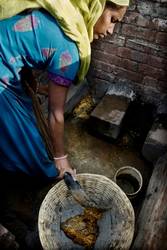Manual scavenging, the removing of human excreta from dry latrines, railroad tracks and sewers by hand, is a caste-based and hereditary occupation form of slavery reserved exclusively for Dalits
It is estimated that around 1.3 million Dalits in India, mostly women, make their living through manual scavenging – a term used to describe the job of removing human excrement from dry toilets and sewers using basic tools such as thin boards, buckets and baskets, lined with sacking, carried on the head.
Manual scavengers earn as little as one rupee a day. Dalit scavengers are rarely able to take up another occupation due to discrimination related to their caste and occupational status, and are thus forced to remain scavengers. They are paid less than minimum wages and are often forced to borrow money from upper-caste neighbours in order to survive and consequently they end up maintaining the relationship of bondage.
Manual scavenging is not a career chosen voluntarily by workers, but is instead a deeply unhealthy, unsavoury and undignified job forced upon these people because of the stigma attached to their caste. The nature of the work itself then reinforces that stigma. Navi Pillay, UN High Commissioner for Human Rights in 2013
Though this vile and inhumane practice was abolished by law in India in 1993 the practice is deeply entrenched in South Asian societies.
The 2014 Human Rights Watch report Cleaning Human Waste: “Manual Scavenging,” Caste, and Discrimination in India documents that manual scavenging’ persists with the support and collusion of local officials. The report is a key resource in learning more about this practice.
In 2013, the Indian parliament enacted The Prohibition of Employment as Manual Scavengers and Their Rehabilitation Act (the 2013 Act) outlawing all manual excrement cleaning. The 2013 Act also recognized a constitutional obligation to correct the historical injustice and indignity suffered by these communities by providing alternate livelihood and other assistance.
In March 2014, the Supreme Court of India ruled that manual scavenging violates international human rights law. The court called for effective remedy. The new Indian government elected in May has pledged to address the needs of India’s marginalized communities, but has yet to take any new measures to end manual scavenging.
“They called our men and said ‘If you don’t start sending your women to clean our toilets, we will beat them up. We will beat you up.’ They said, ‘We will not let you live in peace.’ We were afraid.” Gangashri, Uttar Pradesh, 2014
People who have left manual scavenging, even those who had the support of community-based civil society initiatives, report significant barriers to accessing housing, employment, and support from existing government programs. Notably, under the 2013 Act, rehabilitation provisions are left to be implemented under existing central and state government schemes – the same set of programs that have not thus far succeeded in ending manual scavenging.
In March 2012, a National Public Hearing on “Rehabilitation of Manual Scavengers and their Children in India” was held to increase the political will to address the issues and sensitize other sections of the society and involve them rehabilitation efforts. Read report
In September 2012, a new and expanded bill on manual scavenging was submitted to the Indian Parliament. It is likely that it will be adopted in 2013.
In December 2012, a two-month long march to end manual scavenging – the Maila Mukti Yatra – crossed 18 Indian states and liberated thousands of Dalit scavengers. On the final day of the march, the UN High Commissioner for Human Rights, Navi Pillay, issued a statement of support to the participants.
Database
IDSN has created an extensive database on caste-based discrimination.
All documents on manual scavenging
Campaigning to stop manual scavenging
Several national and international campaigns have been launched to eliminate manual scavenging. In 2007, the ‘Liberation movement of those employed as scavengers’ (Safari Karamchari Andolan-SKA) launched an international campaign – ‘Action 2010’ demanding an end to manual scavenging by the October 2010 Commonwealth Games, in Delhi.
The same year, the International Labour Organisation (ILO) Committee of Experts urged the Government of India to, “take decisive action to eradicate manual scavenging and to report on nation and state-wide action taken to put an end to this practice and on the progress made in the identification, liberation and rehabilitation of scavengers.”
DSN-UK’s FOUL PLAY campaign was launched in solidarity with the SKA and made a number of recommendations to the Indian and the UK Governments, as well as the Commonwealth Secretariat which they are expected to fulfil before hosting the 2010 games. DSN-UK supported SKA in its demands including the release of over Rs. 800 crores for the rehabilitation of Manual Scavengers.
Rashtriya Garima Abhiyan – Jan Sahas is a national level movement which works for the total eradication of manual scavenging and the empowerment of Dalits and other vulnerable section of society. It is a partner of the ILO in India.
Safai Karmachari Andolan – a movement to eradicate manual scavenging in India
Rashtriya Garima Abhiyan – Jan Sahas
Maila Mukti Yatra – a march for the eradication of manual scavenging, taking place in November 2009
Videos – Manual Scavenging
Below is a video dealing with manual scavenging. Visit IDSN’s YouTube Channel for more videos on other themes/countries.



















